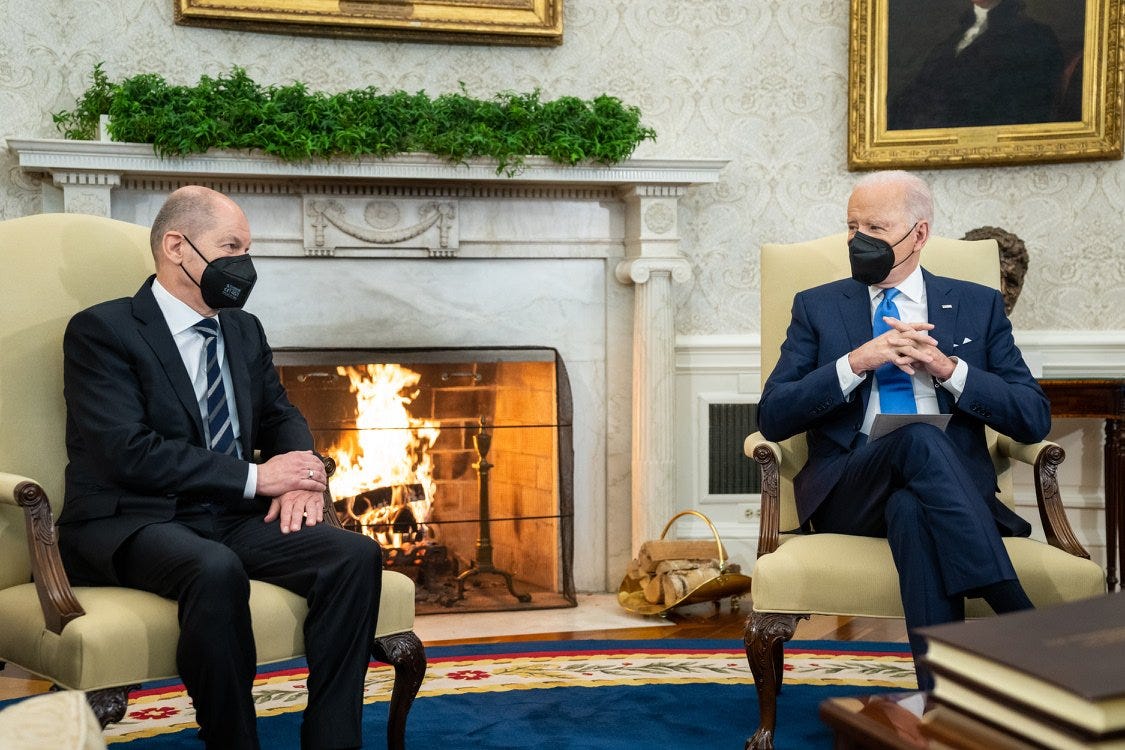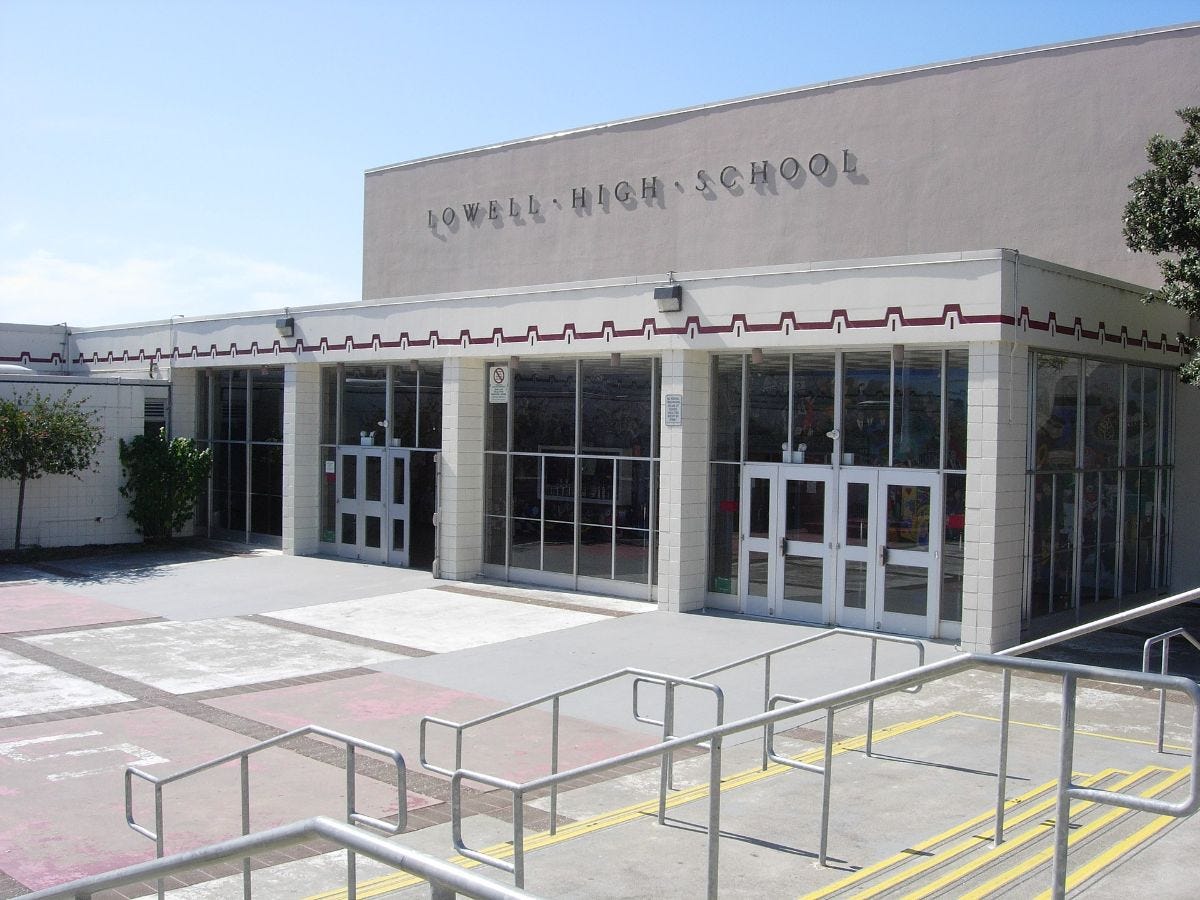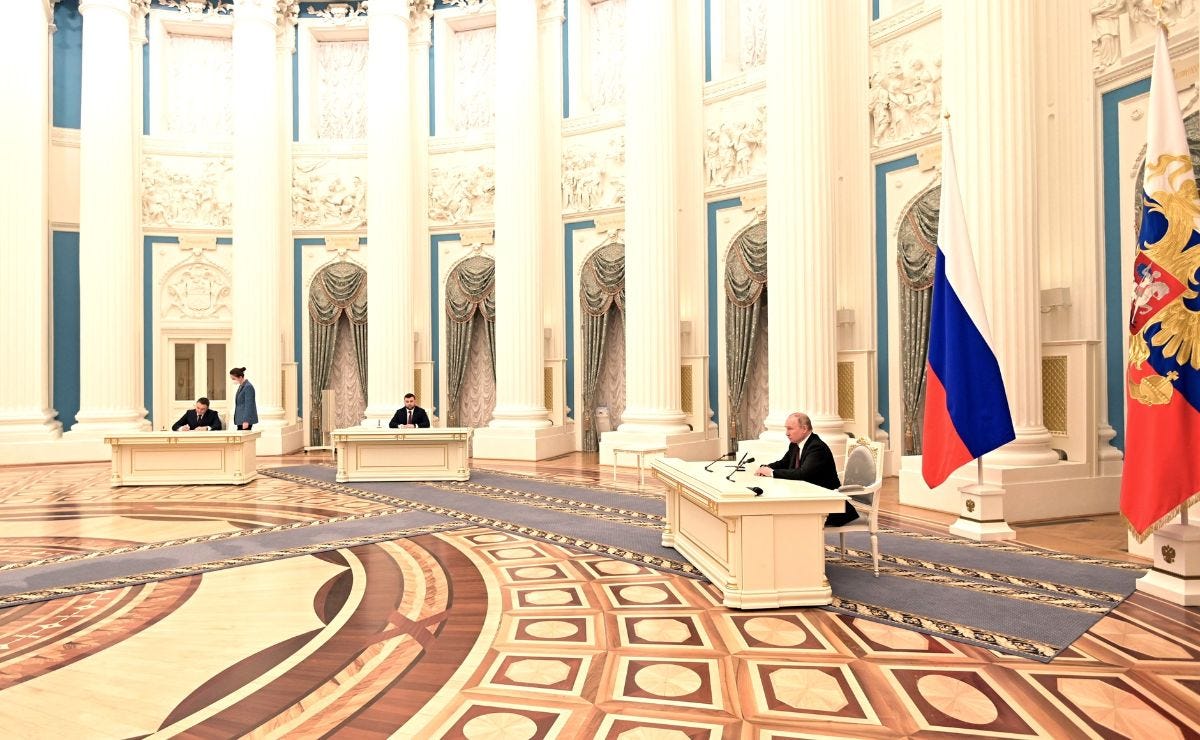Wake Up To Politics - February 22, 2022
Wake Up To Politics: What does Biden consider an “invasion"?
by Gabe Fleisher
Good morning! It’s Tuesday, February 22, 2022. Or Twosday, 2/22/22, if you prefer.
Election Day 2022 is 259 days away. Election Day 2024 is 987 days away.
Breaking: Putin sends troops into Ukraine
Russian President Vladimir Putin ordered forces into eastern Ukraine on Monday, marking a long-feared turning point after spending months amassing upwards of 150,000 troops around the country.
The Russian troops — referred to by Moscow as “peacekeepers” — then began moving into two breakaway areas of Ukraine, which Putin formally recognized as independent republics hours earlier.
Both areas of Ukraine’s east, which have dubbed themselves the “Donetsk People’s Republic” and the “Luhansk People’s Republic,” have been controlled by Russian-backed separatists since 2014. But Putin had not offered his formal blessing to the separatists until Monday, when he claimed they were in need of protection from the Ukrainian government, despite a lack of any evidence that Kyiv plans to attack them.
Putin made his announcement in the midst of a scorching 40-minute address, in which he reeled off a number of historically dubious claims to dismiss Ukraine’s sovereignty and attack the West.
“Modern Ukraine was entirely and fully created by Russia,” he pronounced, adding that “Ukraine for us is not just a neighboring country, it is an integral part of our own history, culture, and spiritual space.”
As he moves towards possibly the largest European conflict since World War II, Putin’s speech also betrayed his broader ambitions: to push NATO’s reach back to where it was before the Soviet Union’s 1991 collapse and redraw the post-Cold War boundaries that have organized Europe ever since.

Now that you’re caught up on Putin’s latest moves, let’s look at how the U.S. is responding, which revolves around this central question:
What does Biden consider an “invasion”?
Putin’s actions immediately sparked swift condemnation across the Western world, including at an emergency meeting of the United Nations Security Council that hastily convened Monday night.
This morning, German Chancellor Olaf Scholz announced the most severe punishment of Moscow yet: a halt to the 750-mile Nord Stream 2 pipeline, which had been set to carry natural gas from Russia to Germany, striking a blow at Russia’s expansive energy industry.
So far, the U.S. response has been limited to an executive order signed by President Biden on Monday, which prohibits Americans from doing business with the two “people’s republics.”
U.S. officials have indicated plans to impose sanctions on Russia later today, in coordination with European allies. But, as Putin likely intended, the initial Western response has been paralyzed by disputes over whether to consider his opening gambit — sending troops into areas already controlled by friendly separatist forces — a full-scale “invasion.”
In a conference call with reporters Monday night, a senior Biden administration official indicated that the Russian moves so far would not trigger the full package of “swift and severe” economic sanctions Biden has promised in response to an invasion.
“The Russian troops moving into Donbas” — the region of Ukraine where the two separatist areas are located — “would not itself be a new step,” the official said. “Russian has had forces in the Donbas region for the past eight years.”

But the Kremlin confirmed this morning that its recognition of the separatist areas extended to the borders claimed by the “republics,” which go beyond the land they currently control, suggesting Russian troops could soon move into Ukrainian-controlled territory.
Underlining the mixed messages of the Western response, European Union foreign policy chief Josep Borrell said this morning both that “Russian troops have entered in Donbas” and that “we consider Donbas part of Ukraine,” but then added that the Russian movements do not constitute a “fully-fledged invasion.”
British government official Sajid Javid, however, told Sky News that “the invasion of Ukraine has begun,” signaling a difference of views within the West.
All eyes will be on the U.S. today to see how far the government goes in imposing sanctions on Russia and describing the movement into the Donbas region. Biden is already facing pressure from Democratic and Republican members of Congress to label the attack an “invasion” and fully levy sanctions.
Among the lawmakers issuing such a call was Sen. Chris Coons (D-DE), one of Biden’s closest allies in Congress and a foreign policy confidant to the president. “The time for taking action to impose significant costs on President Putin and the Kremlin starts now,” Coons declared in a statement.
Each morning, WUTP’s team of contributors rotate to offer a briefing on the latest news in a different policy area.
It’s Tuesday, so Kirsten Shaw Mettler is here with the education policy news to know this week:
The recall of three San Francisco school board members offered a fresh reminder of the political potency of education issues. School Board President Gabriela Lopez, Commissioner Faauuga Moliga, and Commissioner Alison M. Collins all lost their seats in the San Francisco school district, which serves over 50,000 students. Parents pointed to Covid-19 school closures, attempts to shift the city’s most prestigious public high school to a lottery admissions system, and efforts to rename school buildings as motivations for the vote.
While a school board recall may not seem like national news, the election is reflective of a growing trend: Democrats are struggling on education issues, even in liberal cities like San Francisco, in the wake of the pandemic. Asian-Americans were seen as instrumental in the election’s outcome, especially after one of the recalled members, Collins, came under fire for racist tweets. In addition, many American-American voters opposed the prestigious high school’s switch to a lottery rather than a merit-based, admissions system.

More education headlines, via Kirsten:
— The Education Department announced plans to forgive $415 million in student debt for nearly 16,000 students who attended fraudulent for-profit institutions.
— Student climate activists at Stanford, Yale, Princeton, MIT, and Vanderbilt have filed legal complaints against their institutions for being invested in fossil fuels.
— Elite high schools are now also facing affirmative action lawsuits.
In honor of Presidents’ Day, I included a list of some of my favorite presidential books in Monday’s newsletter.
I also asked you to send in your favorites too — so here’s a sampling of some of the presidential books recommended by Wake Up To Politics readers. And I vouch for several of them as well!
“The Years of Lyndon Johnson” by Robert Caro (series)
“It goes really deep into LBJ’s personality and psyche, and tells the story not just of him but of all the people and communities he interacted with, and eventually of America itself during his life (1900s-1960s). Also, Caro is a terrific writer and he makes the most dry technical senate politics high drama — because it was! It’s a classic for reason.” — Bee T.
“The Boys on the Bus” by Timothy Crouse
“I remember reading this back in the 1970s. It focuses on the press covering the 1972 presidential campaign. I recommend it as very entertaining. Of course, that was in the days before the Internet and instant news cycles, so it is a window into a different world from the one you are inhabiting as a political journalist today.” — Art L.
“The Making of the President 1960” by Theodore White
“1960 was the first [in White’s series], really special. Something really new. And the stories about Dick Tuck the highlight.” — Charles P.
“Washington: A Life” and “Grant” by Ron Chernow
“They are lengthy but well worth the time.”— Margaret B.
“Team of Rivals: The Political Genius of Abraham Lincoln” by Doris Kearns Goodwin
“My all-time favorite.”— Patty S.
All times Eastern.
President Joe Biden and Vice President Kamala Harris will receive their daily intelligence briefing at 3:30 p.m.
Later, at 3:30 p.m., Biden will host a virtual event to announce new investments in domestic mineral production, in an effort to address supply chain shortages. Gov. Gavin Newsom (D-CA) will participate in the event, along with a trio of mineral company CEOs and the president of United Steel Workers.
Secretary of State Antony Blinken will meet with Ukrainian Foreign Minister Dmytro Kuleba at 2 p.m. The duo will then hold a joint press conference at 3:15 p.m.
White House Press Secretary Jen Psaki will hold her daily press briefing at 2 p.m.
The House and Senate are both on recess. Each chamber will hold pro forma sessions today — brief meetings held only to fulfill the constitutional requirement that they meet every three days.
The House will convene at 12:30 p.m., with the Senate following at 3 p.m. No business is expected to be conducted in either session.
The Supreme Court will release orders at 9:30 a.m. and then hear oral arguments in two cases related to Native American tribes.
At 10 a.m., the court will hear arguments in Ysleta del Sur Pueblo v. Texas, which SCOTUSblog called “yet another installment in the decades-long conflict between state gambling regulators and Native American tribes.” In this case, the Ysleta del Sur Pueblo, a small Native American tribe located near El Paso, is suing Texas over the state’s attempts to close its bingo-themed casino.
At 11 a.m., the court will hear arguments in Denezpi v. United States, in which Merle Denezpi — an accused sexual offender who is a citizen of the Navajo Nation — is fighting his indictment by a federal grand jury, arguing that the charges constitute “double jeopardy” since he was already sentenced by a tribal court.
That’s it for today. If you enjoy Wake Up To Politics, it’s always appreciated if you donate to support the newsletter or buy some merch. Or if you tell your friends and family to sign up at wakeuptopolitics.com.
If you have any questions or feedback, feel free to email me: my inbox is always open.
Thanks for waking up to politics! Have a great day.
— Gabe




